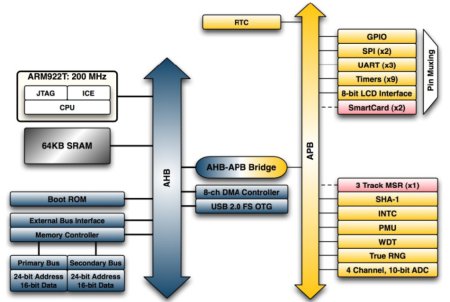ARM9 SoC targets Linux control applications
Sep 30, 2008 — by Eric Brown — from the LinuxDevices Archive — 5 viewsZilog announced a 32-bit RISC system-on-chip (SoC) based on an ARM9 core. Targeted at embedded control, connectivity, and security applications, and available with a Linux BSP (board support package) and tools, the Encore 32 Series Microcontroller offers USB, LCD, and SPI interfaces, and an integrated memory controller, says Zilog.
Applications for the new Encore 32 SoC include access control, home and office monitoring and control, multimedia, healthcare monitoring, telematics, GPS, cameras, and universal remote controls, says Zilog. The Encore 32 can be purchased with optional smartcard or magnetic card readers, says the company.
The Encore 32 is based on an ARM922T core with a 32/16-bit RISC architecture (ARMv4T). The part's integrated memory controller is said to offer an external bus interface to standard asynchronous memories including SRAM, ROM, Flash, and PC100/133 SDRAM.

Encore 32 block diagram
(Click to enlarge)
Specifications listed for the Encore 32 are said to include:
- Core — ARM922T with 32/16-bit RISC architecture (ARMv4T)
- Memory — 64KB embedded SRAM; memory controller supports SRAM, ROM, flash, and standard PC100/133 SDRAM
- Display — LCD interface, supporting 4-bit or 8-bit data, and 3-control
- USB — full speed USB 2.0 On-the-Go (OTG) controller
- SPI — 2 x dedicated Serial Peripheral Interfaces
- GPIO — up to 76 General-Purpose Input/Output (GPIO) pins; 16 pins dedicated
- UARTs — 1 x 8-wire interface; 2 x 4-wire interface (UART2 shared with IrDA encoder/decoder)
- Optional interfaces — smartcard reader; magnetic card reader
- ADC — 4-channel, 10-bit SAR (successive approximation) ADC (45kHz)
- DMA controller — 8 channels with memory-to-memory, memory-to-peripheral, peripheral-to-memory; 32-bit source and destination addresses with 24-bit (16 MB) increments; up to 16MB for each DMA buffer
- Operating system — Linux BSP
Zilog offers its own Encore 32 development toolkit that features a Linux BSP. The BSP provides “a fully ported Linux environment that can be used for testing and preliminary software development,” says the company. BSP components are said to include:
- Source and sample code
- Custom scheduler supporting co-operative multitasking, memory management, and interrupt processing FAT16 file system over CF, SD, and USB
- Toolchain supported by GNU ARM GCC compiler version 4.1.0
- Sample device drivers
The Encore 32 is also supported by software development tools from ARM's Keil business, says Zilog.
Stated Tony Massimini of Semico Research, “The 32-bit MCU market has high growth potential with an expected CAGR (2008 – 2012) of 14 percent on revenues. By 2007, ARM MCUs accounted for 19.3 percent of 32-bit MCU sales.”
Stated Mike Orr, Zilog GM, Microcontroller Business Unit, “Product manufacturers are seeking microcontrollers with more advanced capabilities. In some cases now, one 32-bit microcontroller is replacing two to three existing 8-bit microcontrollers (MCUs) or is being used for 'command and control' of several other existing MCUs, providing more agility with complex instructions.”
Availability
The Encore 32 Series Microcontroller is in production and now available to ship to “customers that place orders through distributors,” says Zilog. More information may be available here.
This article was originally published on LinuxDevices.com and has been donated to the open source community by QuinStreet Inc. Please visit LinuxToday.com for up-to-date news and articles about Linux and open source.